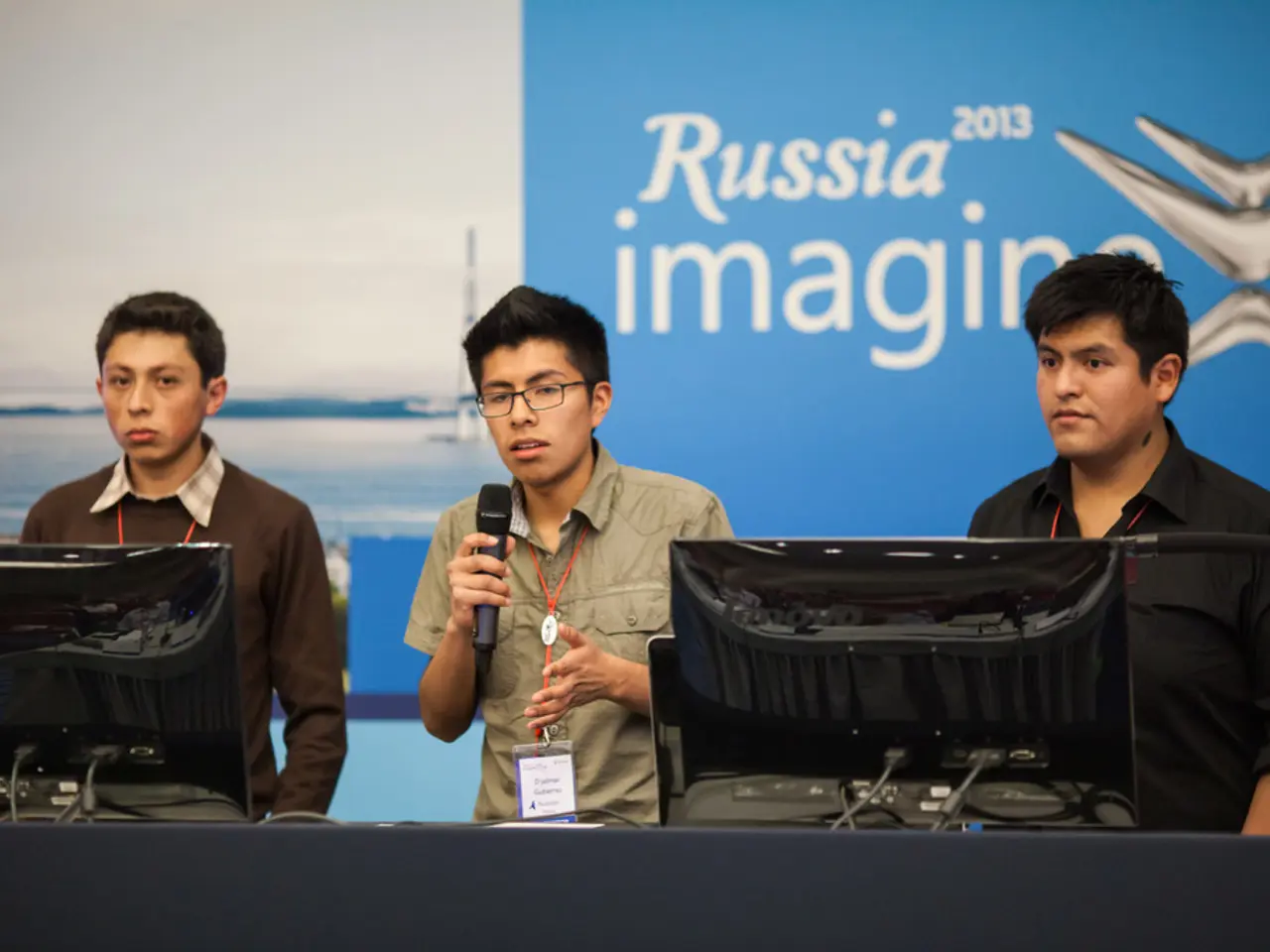Telecommunication regulator, Roskomnadzor, imposes limitations on access to calls on Telegram and WhatsApp platforms
In a move aimed at combating fraud, extortion, and recruitment for terrorism, the Russian telecommunications regulator Roskomnadzor has partially restricted voice and video calls on the popular messaging apps WhatsApp and Telegram [1][2][3]. This decision has significantly impacted many Russians, disrupting everyday communication, especially for elderly people, remote workers, and even soldiers communicating with family.
The regulator claims that these foreign messengers do not ensure the safety of Russian users, with nearly all fraudulent calls allegedly moving to these platforms [1][2]. The restrictions do not affect text messaging, but users report feelings of isolation due to the loss of call functionality [3][4].
The government's motive behind this action is to push Russian internet users towards a new, state-managed "super app" called Max, developed by VKontakte. Max aims to replace foreign messaging platforms with a nationally controlled alternative, although it is still in development and lacks some advanced features found in WhatsApp and Telegram [2][3].
As of 16:00 Moscow time on August 13, complaints about WhatsApp and Telegram continue to come in, with users experiencing disruptions in their calls [11][11]. The exact cause of these disruptions is not yet confirmed, and no specific entity or organization has publicly acknowledged the "selective blocking" of calls in Telegram and WhatsApp [15].
Anton Nemkin, a member of the Information Policy Committee, has stated that the partial restriction of calls in WhatsApp and Telegram is a necessary measure to protect citizens from telephone and internet fraud [16]. Thousands of hacked accounts, number and identity theft of bank employees, phishing, and data theft have become common issues in WhatsApp, as stated by Nemkin [16].
The Ministry of Digital Development believes that this decision will also reduce the risk of financial liability for telecom operators due to the actions of scammers [9]. The Ministry made this statement in response to the partial restriction of calls in foreign messengers, as reported by RIA Novosti [8].
It is expected that the decision by Roskomnadzor to partially restrict calls in foreign messengers will help more effectively counter criminals and make online communication safer [13]. Access to the calling services in foreign messengers will be restored if they comply with Russian legislation [12].
Sources in Forbes on August 11 claimed that operators of the "big four" (MTS, MegaFon, Beeline, and Tele2) asked authorities to block calls in foreign messengers, but these claims have not been officially confirmed by the operators or the authorities [6][7]. A similar report was made by a source in the government to "Cautiously Media" on August 9 [10].
According to information on the Downdetector website, over 3,100 complaints were received about WhatsApp and over 3,600 about Telegram in one day [14]. The decision by Roskomnadzor to partially restrict calls in foreign messengers is part of a wider government effort to tighten control over communication platforms in Russia [1][2][3].
[1] https://tass.ru/obschestvo/13617928 [2] https://ria.ru/20210809/whatsapp-1774643747.html [3] https://www.kommersant.ru/doc/4633840 [4] https://www.forbes.ru/business/553318-rossiyskiy-telekom-market-rasskazal-o-vzryve-protestov-iz-za-zapretov-v-whatsapp-i-telegram [5] https://www.forbes.ru/business/553261-rossiyskiy-telekom-market-rasskazal-o-vzryve-protestov-iz-za-zapretov-v-whatsapp-i-telegram [6] https://www.forbes.ru/business/553261-rossiyskiy-telekom-market-rasskazal-o-vzryve-protestov-iz-za-zapretov-v-whatsapp-i-telegram [7] https://www.forbes.ru/business/553318-rossiyskiy-telekom-market-rasskazal-o-vzryve-protestov-iz-za-zapretov-v-whatsapp-i-telegram [8] https://ria.ru/20210813/whatsapp-1775130041.html [9] https://tass.ru/obschestvo/13617928 [10] https://www.cautiouslymedia.com/news/2021/08/09/rossiyskiy-telekom-market-rasskazal-o-vzryve-protestov-iz-za-zapretov-v-whatsapp-i-telegram/ [11] https://www.forbes.ru/business/553318-rossiyskiy-telekom-market-rasskazal-o-vzryve-protestov-iz-za-zapretov-v-whatsapp-i-telegram [12] https://ria.ru/20210813/whatsapp-1775130041.html [13] https://tass.ru/obschestvo/13617928 [14] https://downdetector.ru/status/whatsapp/map/ [15] https://www.forbes.ru/business/553318-rossiyskiy-telekom-market-rasskazal-o-vzryve-protestov-iz-za-zapretov-v-whatsapp-i-telegram [16] https://www.forbes.ru/business/553261-rossiyskiy-telekom-market-rasskazal-o-vzryve-protestov-iz-za-zapretov-v-whatsapp-i-telegram
- The Russian government's new policy-and-legislation on digital communication, aimed at blocking foreign messaging platforms like WhatsApp and Telegram due to concerns about fraud, extortion, and national security, has sparked a debate in politics about the balance between internet freedom and general-news.
- In the midst of continuing controversy over the partial restriction of call services in popular messaging apps, an increasing focus has been placed on the development and implementation of a state-managed "super app" called Max, as a potential solution for crime-and-justice issues associated with security breaches in foreign messengers.








